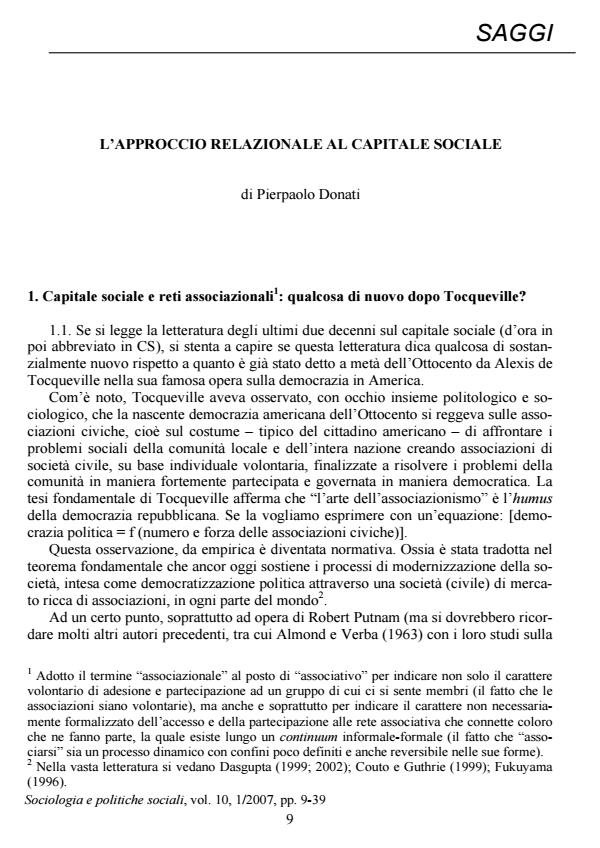L'approccio relazionale al capitale sociale
Journal title SOCIOLOGIA E POLITICHE SOCIALI
Author/s Pierpaolo Donati
Publishing Year 2007 Issue 2007/1
Language Italian Pages 31 P. 9-39 File size 228 KB
DOI
DOI is like a bar code for intellectual property: to have more infomation
click here
Below, you can see the article first page
If you want to buy this article in PDF format, you can do it, following the instructions to buy download credits

FrancoAngeli is member of Publishers International Linking Association, Inc (PILA), a not-for-profit association which run the CrossRef service enabling links to and from online scholarly content.
The relational approach to social capital(by Pierpaolo Donati) - ARBASTRACT: The essay questions the theory of social capital as formulated and developed by political scientists (such as R. Putnam), asking whether it brings something really new and different from the theory put forward by A. de Tocqueville and other scholars when dealing with the issue of the relevance of associative networks for the flourishing of civic culture. The Author claims that the political theory of social capital, which conceives of social capital as civicness, does not add any substantial contribution to what we already know from the political scientist of the past. Moreover, it is quite often misleading in so far as it obscures and depreciates the properties and qualities of social capital as a specific social relation. The Author outlines a new approach to the study of social capital, called relational approach, which distinguishes itself from the individualistic and holistic approaches in the social sciences. According to the relational theory of society elaborated by Donati, social capital is a property and a quality of social relationships, not an attribute of individuals or social structures; it is not a mixture of the two either. This theory has many advantages: first, it leads us to observe and analyse in a very sophisticated way the different analytical components of social capital (by using a revised version of the Parsonian AGIL scheme, as developed by the relational theory); second, it permits to distinguish between the various forms of social capital (primary, communitarian and civic or generalized social capital); third, it is able to show in which social networks different kinds of social capital are produced with respect to two paradigmatic societal arrangements, viz. the lib-lab and the societal configurations. Its main achievement is to put a new light on the most original and genuine aspects of social capital, namely the fact that social capital generates what the Author calls relational goods. As a relational good, social capital is a kind of good which is neither an asset possessed by the individual, nor a collective property belonging to some social structure, but a peculiar configuration of those social networks which are shared by people who will not be able to produce such goods outside their reciprocal relations. This theory is evidence based. Last, but not least, it can show where, how and why social capital may produce relational bads instead of relational goods.
Pierpaolo Donati, L'approccio relazionale al capitale sociale in "SOCIOLOGIA E POLITICHE SOCIALI" 1/2007, pp 9-39, DOI: